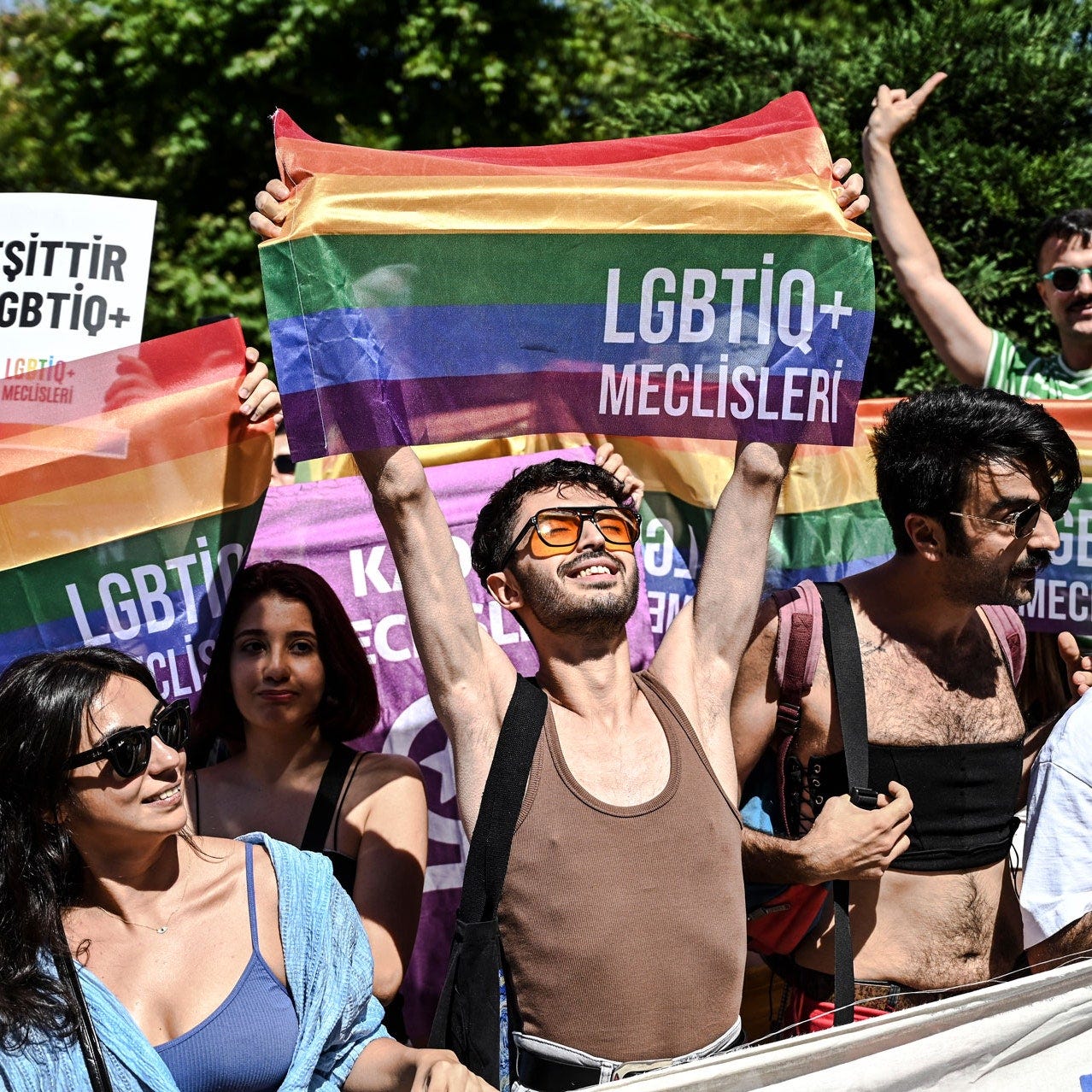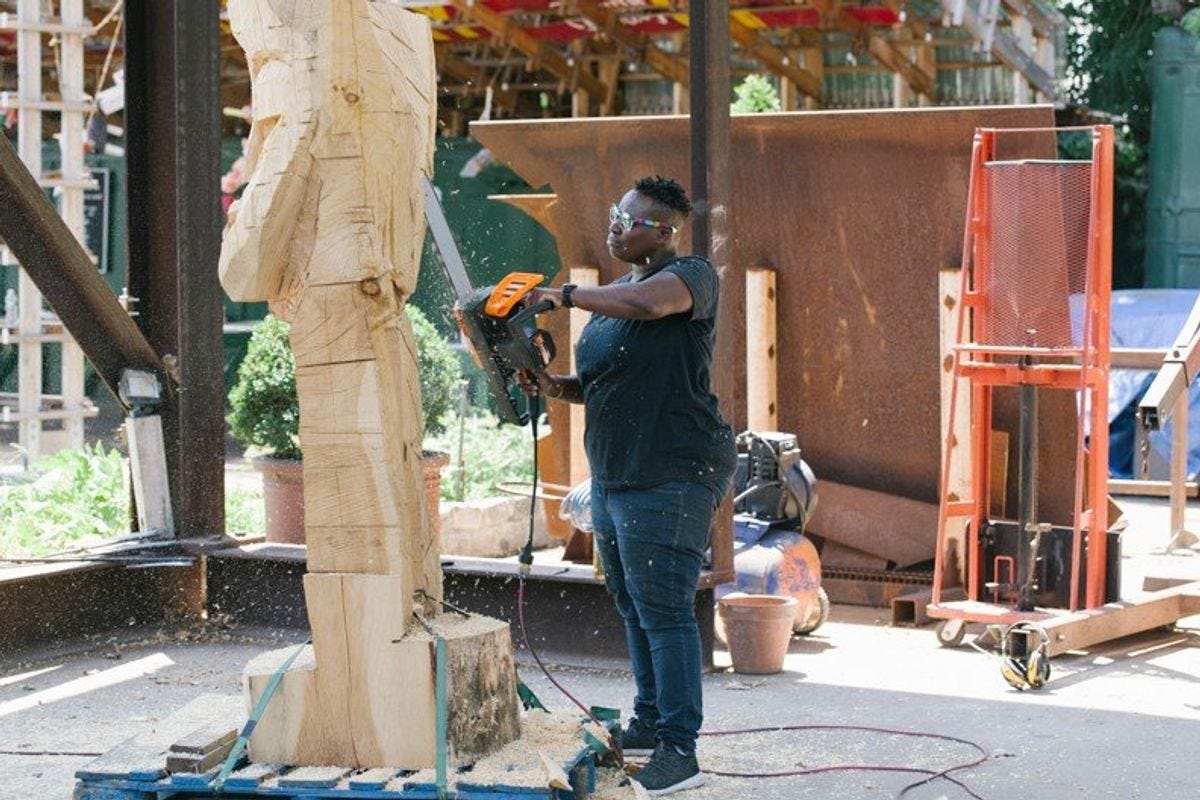Global Roundup: Afghan Women Study in Iran, Turkey Pride, Singapore Pro-Palestine Activists, Pakistan Midwife, Uganda Artist & LGBTQ+ Activist
Curated by FG Contributor Samiha Hossain
Hasina, left, with fellow students outside the Iran University of Medical Sciences in Tehran, where she is studying medicine. Photograph: Courtesy of Stefanie Glinsk
For two years, that has meant that Hasina, a 24-year-old medical student, continue her studies. As a precaution, Hasina – whose full name has not been given to protect her identity – left Afghanistan with a tourist visa for Iran. She was accompanied by her father, they posed as a family going on a visit, but he returned home alone. Now, Hasina is enrolled at the Iran University of Medical Sciences in the capital, studying to become a surgeon. More than 40,000 Afghan students – most of them women – are now studying at university in Iran, according to the country’s deputy science minister for international affairs, Vahid Haddadi-Asl.
I miss my family and my home and I hope that one day I can go back; I hope the oppression women across our country face will end. Still, nothing can compensate for the years the Taliban has stolen from Afghan girls and women, including from me. -Hasina
Heather Barr, assistant director of Human Rights Watch’s Women’s Rights Division, says there are no signs of any positive developments regarding education or women’s rights in Afghanistan. She adds that the Taliban’s ban has been “denounced by the Muslim community, including Afghanistan’s neighbours Iran and Pakistan”, two countries where many Afghan women now study. Many Iranians have voiced concerns over growing numbers of Afghans entering the country, with Afghans repeatedly reporting discriminatory and derogatory behaviour towards them.
Farzaneh, 23, arrived in Tehran four months ago, accompanied by her brother, to continue her journalism studies. For two years after the Taliban took over, she struggled to find a way to continue her studies – this year she was finally accepted into university in Tehran.
Most women just want to leave Afghanistan now to rebuild their destroyed dreams elsewhere. This is so painful to me. If the situation for women continues like it has, I don’t have hope. I’m studying to make my family – my father – proud, but I miss my friends and my home. I remember those days when we smiled and were happy together. These days are gone. -Farzaheh
Photo: KEMAL ASLAN/Getty Images
Over 100 people participated in a Pride parade in Istanbul, Turkey last weekend, despite such festivities being banned since 2015, when the governor cited security and “public sensitivities” as grounds for shutting them down. In order to circumvent the ban, the organizers avoided the area where Pride events have typically taken place and which had been fenced off by police, gathering instead in a neighborhood across town.
But the event was not without incident: As ABC News reported, the Istanbul Pride Committee heard “unconfirmed reports” of at least 15 protestors being detained. Nevertheless, photos and videos of Istanbul Pride participants waving Pride flags and holding protest signs soon made it to social media, along with a defiant statement from Istanbul Pride.
Today, you closed down Istiklal, blocked all roads and squares leading to it. You halted life in a whole city…But you forgot one thing: if necessary, we can pierce through stones, bend time, and once again find each other in our smiles. -Istanbul Pride via Twitter/X
Istanbul Pride, which began in 2003, was once a major event, attracting as many as 100,000 people in 2014. When Pride protestors marched in 2019, they faced police who fired plastic bullets and tear gas at them. That same year, 25 students were arrested and stood trial for holding a Pride parade at Middle East Technical University in the Turkish capital of Ankara. This crackdown on Pride celebrations coincides with the anti-LGBTQ+ policies of Turkish President Recep Tayyip Erdogan.
Although homosexuality isn’t illegal in Turkey, the LGBTQ+ community has no federal laws protecting queer and trans people from discrimination. Nevertheless, Istanbul Pride and their supporters remained resolute in their 2024 Pride statement.
Photo: Transformative Justice Collective
Three women activists in Singapore have been charged over rallying people to deliver letters to the prime minister urging him to end ties with Israel. Singapore strictly regulates protests, and public demonstrations advocating causes of other countries are not allowed.
In February, the activists –Annamalai Kokila Parvathi, Siti Amirah Mohamed Asrori and Mossammad Sobikun Nahar – led about 70 people on a metres-long walk from a popular mall on Singapore's main shopping street Orchard Road to the presidential compound next door. Photos of the procession posted on social media show participants carrying umbrellas looking like watermelons, a symbol of solidarity with Palestine. The group stopped at the gates of the compound, which also houses the prime minister's office, and handed a sheaf of 140 letters to staff. Authorities say the activists had organised the event without a permit. The women have not indicated yet whether they would plead guilty. They could be fined up to S$10,000 (£5,800, $7,300 ) or jailed for up to six months.
Last week when the women were released on bail, they appeared to strike a defiant note through their attire. Ms Amirah wore a shawl resembling the keffiyeh, the traditional Arab headdress that has become a symbol of Palestinian activism, while Ms Annamalai wore a T-shirt with the words "Justice Now!". Local advocacy group the Transformative Justice Collective, which Ms Annamalai co-founded, described the charges as "a continuation of the intimidation of peaceful support for Palestinian lives in Singapore".
The police also released a statement urging Singaporeans "not to engage in activities that will damage the peace, public order and social harmony" and not to "break the law to express their views, nor emulate the protesters in other countries". Singapore and Israel have a long-standing defence partnership, which includes arms trade. Israel also helped to build up the South East Asian country's military in its early years of independence, and the two countries also cooperate in industrial research, education and business. Since October 7, the government has taken a neutral stance while also making it clear it would not tolerate anything it deems as stoking social tensions.
Midwife Neha Mankani (L) examines an infant at a clinic in Baba island, in Karachi © Rizwan TABASSUM / AFP
Each week Midwife Neha Mankani, 38, comes by boat ambulance to Baba, an old fishing settlement in Pakistan and reportedly one of the world's most crowded islands. Climate change is swelling the surrounding seas and baking the land with rising temperatures. Until Mankani's ambulance launched last year, expectant mothers were marooned at the mercy of the elements.
Heatwaves are becoming hotter, longer and more frequent in Pakistan, one of the countries most vulnerable to extreme weather conditions resulting from climate change. In May and June, a string of heatwaves have seen temperatures top 52 degrees Celcius (126 degrees Fahrenheit) for days.
Climate change doesn't affect everyone equally. Pregnant women and newborns, postpartum women are definitely more affected. In the summer months, we see a real increase in low-birth weights, preterm births, and in pregnancy losses. -Neha Mankani
In Pakistan, 154 women die for every 100,000 live births -— a high maternal mortality rate shaped by socioeconomic status, barriers to healthcare access and limited decision-making powers, especially among young women, according to the United Nations. Mankani began her 16-year career as a midwife in a Karachi hospital, where she worked at a high-risk ward, often treating women from the five islands dotted off the coast. She founded the Mama Baby Fund in 2015 and set up the first clinics on the islands for expectant and new mothers. The free 24/7 boat ambulance followed last year, crucially equipped to navigate rough seas in a region increasingly prone to flooding.
Girls on the impoverished islands are often wed as young as 16, with marriage considered the source of security for women in an area where polluted water is killing off the fishing trade. With no access to running water and little electricity, warding off heat stress is a challenge for all the islanders. Women are at particular risk, typically responsible for cooking over open flames in small rooms with no fans or proper ventilation.
Ayesha Mansoor, 30, has four children and lives on the fringes of Baba, with just four to five hours of electricity a day. The path to her home is covered by a carpet of discarded plastic bags which disappear underwater when the tide is high.
I used to wonder why we women didn't have any facilities here, a clinic that could just cater to us. When Neha opened her clinic, I saw a way that I could help the women of my community. -Ayesha Mansoor
Leilah Babirye’s first solo museum exhibition explores themes of African art history and queer identity. Photo by Mark Hartman/Courtesy of Stephen Friedman Gallery, London and New York.
Ugandan visual artist and LGBTQ+ activist Leilah Babirye’s first solo museum exhibition in the U.S., ‘We Have a History,’ which is on view at the de Young Museum in San Francisco till June 22, 2025. Growing up in Uganda, Babirye was deeply inspired by traditional African ceramic and wood-carving techniques observed from local artisans. But it was her journey from Kampala to New York City that significantly shaped her creative work today. In order to earn a living, Babirye collected cans off the street and made food deliveries on her bike.
The combination of experiences I had when I moved here has shaped my art in many ways, such as using cans and bicycle tires within my art…My works represent all of the amazing people I’ve met along the way. -Leilah Babirye
The new exhibition, which juxtaposes old and new works, explores themes of African art history and queer identity. It draws inspiration from the style and resilience of drag queens and the transgender community; Babirye even named three new sculptures after her friends from the Ugandan queer community. OkayAfrica interviewed Babirye about the significance behind her exhibition’s title and inspiration behind her new sculptures and the journey to the U.S., and more.
The title of Babirye’s exhibition is inspired by the combination of old and new works within the exhibition, she says. It is also a reflection of how her work speaks to the existing permanent African Art collection at the museum. She also discusses how queer activism influences her art and how many LGBTQ+ people are not supported by their families.
I’m building a queer family through my art…The figures I create are inspired by drag queens and the transgender community because I love their style. This is why I adorn my sculptures with found objects representing jewelry, hairstyles, makeup, and accessories. I often name my sculptures after Ugandan LGTBQ+ activists, friends and public figures. -Leilah Babirye
Babirye hopes to empower the audience through her work and to give people a sense of belonging. She says she is “excited to continue uplifting the LGBTQ+ community worldwide through [her] work. She has several upcoming projects and exhibitions.
Thank you for reading Global Roundup. You can support FEMINIST GIANT by:
Hitting the heart button so that others can be intrigued and read
Upgrading to a paid subscription to help keep FEMINIST GIANT free
Opting for a one-time payment via buying me a coffee
Sharing this post by email or on social media
Samiha Hossain (she/her) is an aspiring urban planner studying at Toronto Metropolitan University. Throughout the years, she has worked in nonprofits with survivors of sexual violence and youth. Samiha firmly believes in the power of connecting with people and listening to their stories to create solidarity and heal as a community. She loves learning about the diverse forms of feminist resistance around the world.






